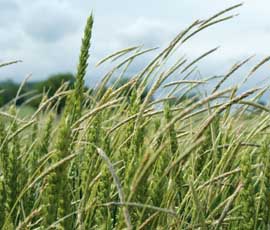Growers urged to tackle blackgrass

Atlantis applications should be made to most wheat crops as soon as the weather allows, urge agronomists.
But all stressed the need for the right application conditions for spraying, pointing out that dry soils have limited the effectiveness of earlier pre-emergence treatments while mild temperatures have encouraged blackgrass growth.
Where herbicide programmes have been halted to wait for rain, the advice was to get them going again. “Given current temperatures, if there’s moisture around the roots, the weeds will be growing, making them susceptible to contact sprays,” said Jim Orson, special adviser with NIAB TAG.
“Some blackgrass is already too far ahead to be controlled with a residual alone and will need a contact material applying. If further emergence is expected, mix a residual with the contact at this timing.”
Conditions for pre-emergence herbicides couldn’t have been worse, admitted his colleague, Oxfordshire agronomist Jon Bellamy.
“In this part of the country, there seems to have been enough moisture underneath for the blackgrass to germinate, but not enough in the top two inches to activate the pre-emergence treatment.”
As a result, well-tillered blackgrass can be found across fields, he reported.” It’s definitely a year for autumn applications of Atlantis (iodosulfuron + mesosulfuron). But getting it on to a dry leaf was critical – if it stays damp all day, it doesn’t get into the plant. So wait for the right weather.”
However, where very dry soil conditions have delayed crop emergence and pre-emergence treatments are still being applied, there’s no urgency, he advised.
“If there’s been no emergence of either crop or weeds to date, as seems to be the case where ploughing took place, it will take another month before they show any decent growth. In this situation, a spring Atlantis treatment will work fine.”
Mark Hemmant of Agrovista also reported poorer results from residual treatments. “It’s not surprising, given the dry conditions. The stale seed-bed opportunity for control wasn’t there either this year. So there’s a lot riding on the post-emergence spray. “
He favoured autumn applications of Atlantis for most crops. “It’s still mild, so it would be sensible to get on, especially in early drilled crops. Leaving it until the spring is a risk – the blackgrass could be monstrous by then.”
Like Mr Bellamy, he stressed that the leaf needs to be dry for Atlantis to work well. “This is a year that it needs to do a good job. The partner product you choose will depend on what pre-emergence herbicide was used, but consider using more flufenacet, pendimthalin or diflufenican.”
Drier areas have had more varied crop emergence, making weed control more difficult, he noted. “But remember that Atlantis does still work into December, if it doesn’t get too cold.”
In Lincolnshire, independent agronomist Sean Sparling warned that fresh crop growth is more prone to damage from herbicide applications.
“The early sown crops are the most at risk, especially in areas getting night-time frosts. They haven’t had the chance to harden up. The later sown crops have grown more slowly and been able to develop a waxy layer gradually.”
He advised growers pushing on with Atlantis applications to keep an eye on the diurnal temperature fluctuations. “If you’re planning to tank mix, or use a stack, this was especially important. Often it’s the adjuvants and safeners which caused the issue, with a bit of yellowing turning into scorching after a night frost.”
His rule of thumb was to hold off if a fluctuation of more than 10C is forecast. “Consistent day and night temperatures are preferable.”

